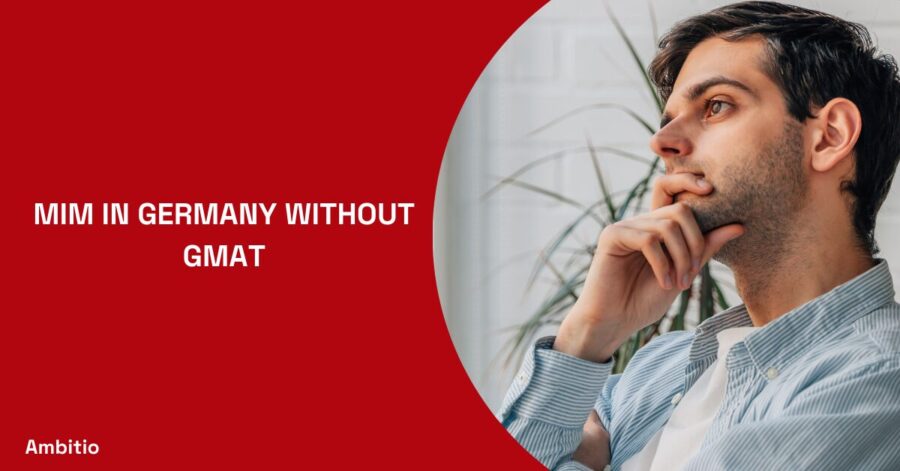14 December 2024
8 minutes read
MIM in Germany Without GMAT: The Ultimate Guide

Why Germany Stands Out for Management Education
Did you know?
Living expenses are also relatively low compared to other European countries like the UK or France.
When one thinks of quality education in Europe, Germany inevitably rises to the top. A blend of rich academic history, coupled with modern, innovative teaching methods, makes Germany a magnet for aspiring management students. What’s more, the availability of programs like MBA and MIM in Germany without GMAT lowers the entry barriers for many.
Key Features of German Education
- World-class Infrastructure: German universities boast state-of-the-art facilities.
- Industry-University Partnerships: Close ties with industries ensure real-world experiences and internships for students.
- Diverse Student Community: A mosaic of cultures ensures holistic exposure and networking opportunities.
Decoding the MIM and MBA Programs
Distinguishing between the MBA and MIM can be perplexing. Let’s demystify these:
MBA (Master of Business Administration):
- Duration: Generally 1-2 years.
- Target Audience: Those with substantial work experience.
- Focus: Enhancing managerial skills, leadership, and strategy.
MIM (Master in Management):
- Duration: Usually a year but can extend to two.
- Target Audience: Fresh graduates or those with limited experience.
- Focus: Imparting foundational management skills and business principles.
Germany’s Top-tier Universities and Their Offerings
Germany has been a hub for higher education for several years, attracting international students from all over the world. When it comes to management studies, the country boasts some of the finest institutions. Below is a table highlighting a few of Germany’s top-tier universities, their renowned programs, location, and unique offerings:
| University | Location | Renowned Programs | Unique Offerings |
|---|---|---|---|
| Ludwig Maximilian University | Munich | MIM, MBA | Strong research focus, collaborations with global institutions, diverse faculty. |
| Technical University of Munich | Munich | MIM in Innovation & Entrepreneurship, MBA | Renowned for its technical and entrepreneurial programs, strong industry ties. |
| University of Mannheim | Mannheim | MIM, MBA in Mannheim Business School | Customized curriculum, extensive alumni network, globally accredited. |
| Frankfurt School of Finance & Management | Frankfurt | MBA, MIM in Digital Business | Financial hub location, specialized finance and digital courses, industry projects. |
| WHU – Otto Beisheim School of Management | Vallendar | MBA, MIM | International exchange programs, strong corporate connections, leadership training. |
| ESMT Berlin | Berlin | MBA, MIM in Global & Digital Strategy | Located in startup hub, offers innovation and digital-focused courses. |
| Leipzig Graduate School of Management | Leipzig | MBA, MIM in Strategy & Digital Business | Emphasis on entrepreneurship, international immersion trips, strong industry partnerships. |
Understanding Eligibility & The Admission Dance
Securing a spot in Germany’s top-tier universities, especially for sought-after programs like Master in Management (MIM) or MBA, involves a detailed understanding of the eligibility criteria and mastering the art of the admission process.
Navigating the intricacies of this ‘admission dance’ can be overwhelming, but with the right insights and preparation, aspirants can make an impactful impression. Let’s delve into the nuances of eligibility and the steps to secure that coveted admission letter.
1. Basic Eligibility Criteria
The foundational requirements for most German universities are:
- Undergraduate Degree: A bachelor’s degree, usually of a three to four-year duration, in a relevant field is mandatory.
- Academic Excellence: Competitive GPA or grade averages, reflecting a strong academic background.
- Language Proficiency: For courses taught in English, IELTS or TOEFL scores are generally required. For German-taught courses, proficiency in the German language (certified by tests like TestDaF or DSH) is essential.
- Work Experience: Especially for MBA programs, universities often seek candidates with a few years of professional experience.
2. Additional Considerations
Beyond the basics, there are other elements that universities look for:
- Letters of Recommendation: Academic and/or professional recommendations that vouch for the candidate’s potential.
- Statement of Purpose (SoP): A well-crafted essay that highlights an applicant’s motivations, aspirations, and reasons for choosing a specific university or course.
- GMAT/GRE Scores: Though many courses now offer admission without GMAT, some universities or specific programs might still require these scores as a measure of analytical and quantitative skills.
3. The Interview Round
Often, after the initial shortlisting:
- Personal Interviews: A face-to-face or virtual interaction where the university assesses the candidate’s interpersonal skills, clarity in goals, and fitment with the course.
- Group Discussions: Some universities might have group exercises or discussions to gauge teamwork and communication abilities.
4. Portfolio & Extracurricular Activities
For some specialized programs:
- Portfolio Submission: Particularly for courses with a creative bend, like design or media management.
- Extracurricular Achievements: Participation in sports, arts, social work, or leadership roles can significantly enhance an application.
5. Financing and Scholarships
An essential aspect to consider:
- Tuition Fee and Living Expenses: Understanding the cost structure helps in planning finances better.
- Scholarship Opportunities: Many German universities offer partial or full scholarships based on academic excellence, leadership potential, or even country-specific criteria.
6. Networking with Current Students or Alumni
A step often overlooked:
- Informational Interviews: Engaging in conversations with current students or alumni provides genuine insights into university life, course structure, and even placement opportunities.
Crunching the Numbers: Costs, Living and Scholarships
When considering studying in Germany, especially programs like Master in Management (MIM) or MBA, a significant factor that comes into play is the financial aspect.
The costs involved, the living expenses, and the potential financial aid can significantly influence one’s decision. Here’s a detailed breakdown of the numbers associated with pursuing higher education in Germany.
1. Tuition Fees
Germany is known for its affordable, and in some cases, zero tuition fees, especially for public universities. However, the numbers can vary:
- Public Universities: Many public universities in Germany charge no tuition fees for international students, especially for undergraduate programs. However, for specialized master’s or MBA courses, there might be nominal fees, typically ranging from €200 to €500 per semester.
- Private Universities: Fees at private institutions are considerably higher, with some MIM or MBA programs costing between €10,000 to €30,000 per year or more.
- Semester Contributions: Irrespective of tuition fees, students might have to pay a semester contribution (Semesterbeitrag) which covers administrative costs, student union fees, and public transportation. This usually ranges from €150 to €350 per semester.
2. Living Expenses
Living costs can vary based on the city and one’s lifestyle:
- Accommodation: Rent is often the most significant monthly expense. In bigger cities like Munich, Berlin, or Frankfurt, a student might spend between €400 to €800 per month on housing, while in smaller cities, it could be as low as €200 to €500.
- Utilities and Internet: Approximately €50 to €100 per month.
- Food and Groceries: Monthly costs can range between €150 to €250.
- Transport: Though the semester contribution often covers public transportation, any additional travels might cost €20 to €50 monthly.
- Miscellaneous (Entertainment, Personal expenses): Approximately €50 to €100.
On average, the German government suggests that an international student needs around €850 to €1,000 per month to cover living expenses.
3. Scholarships and Financial Aid
Germany offers numerous scholarship opportunities for international students:
- DAAD Scholarships: The German Academic Exchange Service (DAAD) offers a wide range of scholarships for international students at various levels of study.
- Erasmus+: For students from EU countries, the Erasmus+ program provides financial support for studying abroad.
- University-specific Scholarships: Many German universities have their own scholarship programs based on merit, field of study, or country of origin.
- External Organizations: Corporations, foundations, and non-profit organizations often provide scholarships or financial grants for deserving students.
4. Working While Studying
Germany’s policies are student-friendly:
- Part-time Jobs: International students can work up to 20 hours a week during the semester and full-time during semester breaks. This not only helps offset living expenses but also provides valuable work experience.
- Internships: Paid internships are common in Germany and can be a good source of income for students, especially those in business or technical fields.
Life after MIM: Opportunities, Salaries, and Growth
Embarking on a Master in Management (MIM) journey in Germany opens the doors to a plethora of opportunities in the global business landscape. As graduates step out with a coveted degree in hand, the horizon is filled with prospects that span across industries, job roles, and countries. Here’s a deeper dive into what awaits post the MIM voyage in Germany.
1. Diverse Job Profiles to Explore
The multidisciplinary nature of a MIM program prepares graduates for a variety of roles in the corporate world:
- Consulting: MIM graduates can delve into strategic consulting, assisting businesses in improving their processes and operations.
- Finance and Banking: From roles in investment banking to asset management and financial analysis, there’s a wide spectrum of opportunities.
- Marketing and Sales: Equipped with skills in market analysis and strategy formulation, graduates can lead branding and sales campaigns.
- Human Resources: MIM alumni can venture into talent management, organizational development, and HR analytics.
- Supply Chain Management: Overseeing product logistics from manufacturers to consumers is another promising avenue.
2. Competitive Salary Packages
Germany, being one of Europe’s leading economies, offers lucrative compensation packages for MIM graduates:
- Entry-Level Roles: Fresh out of university, MIM graduates can expect average starting salaries ranging from €45,000 to €55,000 annually.
- Mid-Level and Senior Roles: With experience, professionals can witness a surge in their compensation, with figures reaching upwards of €100,000, especially in sectors like finance and consulting.
3. Growth Trajectory and Career Advancement
The MIM degree is structured to lay a strong foundation in management, which facilitates steady career progression:
- Fast-Track Promotions: The comprehensive knowledge acquired during the MIM often results in graduates ascending the corporate ladder at a faster pace compared to their peers.
- Diverse Industries: The versatility of the MIM degree allows graduates to switch between industries, from tech to healthcare or finance, providing dynamic career paths.
- Global Mobility: A MIM degree from Germany is recognized worldwide. This global acknowledgment ensures that graduates can seek opportunities not just in Germany but across the globe.
4. Continuing Education and Specializations
For those looking to further sharpen their skillset:
- MBA: Some MIM graduates opt for an MBA after garnering a few years of work experience to attain senior management or leadership roles.
- Ph.D. and Research: Those inclined towards academia can delve into research roles or pursue a doctorate in their chosen field.
- Industry-Specific Certifications: Certifications in areas like data analytics, digital marketing, or financial modeling can further enhance one’s profile.
5. Networking and Alumni Connections
German universities have a vast alumni base spread globally:
- Alumni Meets and Conclaves: Regular events foster interactions, ensuring that graduates remain connected and can leverage these networks for job referrals and collaborations.
- Industry Collaborations: German institutions often have tie-ups with top global companies, providing an immediate platform for internships, projects, and eventual placements.
Navigating the German Job Market Post Graduation
Germany, often hailed as the powerhouse of Europe, boasts a dynamic and diverse job market that welcomes talent from various corners of the world. For those who’ve completed their MIM or MBA in Germany without GMAT, stepping into this professional realm can be both exciting and challenging. Here’s a comprehensive guide to help you navigate the German job market post-graduation.
1. Understanding the Job Market Dynamics
Germany’s economy is characterized by its robustness and versatility. Several sectors are continually in need of fresh talent:
- Automobile: Being the homeland of brands like BMW, Mercedes-Benz, and Volkswagen, the German automobile sector offers numerous opportunities for management graduates.
- Finance: Frankfurt, often termed the financial capital of Europe, has a plethora of roles for those keen on banking, asset management, and financial consulting.
- Information Technology: With the digital revolution, Germany has a burgeoning IT sector that requires managerial expertise.
- Pharmaceuticals and Healthcare: Companies like Bayer and Boehringer Ingelheim are always on the lookout for skilled management professionals.
2. Role of Language in the Job Market
While many businesses operate in English, a grasp of the German language can be a significant advantage:
- Networking: Speaking German can help in building professional connections and attending local industry events.
- Job Applications: Many local companies, especially outside major cities, might require resumes and cover letters in German.
- Work Culture: Understanding the nuances of the language can help in better assimilation into the German work culture.
3. Work Visa and Regulations
Post your studies, international students can extend their residence permit for up to 18 months to seek employment:
- Job Seeker Visa: This visa allows graduates to stay and seek employment. Once you secure a job, this can be converted into a work visa.
- Blue Card: For those from non-EU countries, the EU Blue Card facilitates staying and working in Germany, provided you have a confirmed job offer.
4. Preparing for the Job Hunt
Entering the German job market requires meticulous preparation:
- CV and Cover Letter: Ensure they are tailored to the specific job you’re applying for. It’s also advisable to have them in both English and German.
- Networking: Attend industry seminars, job fairs, and alumni events to expand your professional network.
- Cultural Etiquettes: Familiarize yourself with German business etiquettes, such as punctuality and direct communication.
5. Entrepreneurial Opportunities
If you’re inclined towards entrepreneurship, Germany provides a conducive environment:
- Startup Ecosystem: Cities like Berlin are becoming European startup hubs, offering a supportive ecosystem and funding opportunities.
- Innovation Grants: The German government offers various grants and programs to foster innovation and entrepreneurship.
- Co-working Spaces: These are abundant, offering a collaborative environment for budding entrepreneurs.
Germany, with its rich academic tapestry, offers a unique blend of traditional and modern teaching methodologies. Pursuing an MBA or MIM in Germany, especially without the shackles of GMAT, is an unparalleled opportunity for holistic personal and professional growth.
FAQs
Can I study for an MBA in Germany without taking the GMAT?
Yes, many MBA colleges in Germany offer programs without the need for GMAT scores.
What is the difference between MBA and MIM
While both are management programs, an MBA is generally for those with more work experience, whereas MIM is suited for fresh graduates or those with limited work experience.
Are courses in Germany taught in English?
Many programs in Germany are offered in English, especially those targeting international students.
Do all universities in Germany offer free education?
While many public universities do not charge tuition fees, some charges may apply. It’s essential to check with each institution.
How can I know more about MIM programs in specific universities?
It’s best to visit the official websites of universities offering MIM in Germany to gather detailed information.

You can study at top universities worldwide!
Get expert tips and tricks to get into top universities with a free expert session.
Book Your Free 30-Minute Session Now! Book a call now




























